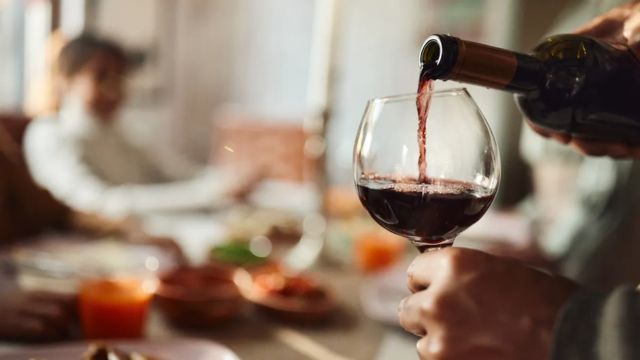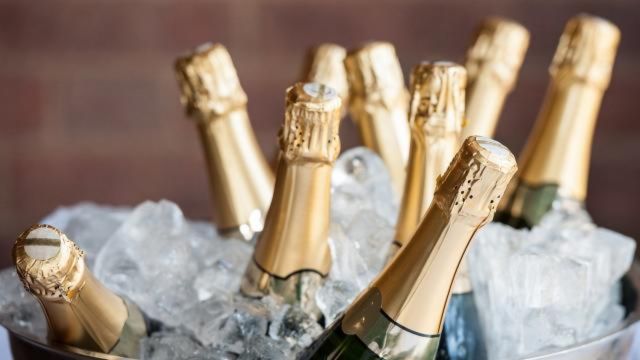New Year’s Eve Beverage Faces Extinction Threat from Climate Change, AI Firm Predicts
By 2050, champagne drinkers might be out of luck, according to research generated by artificial intelligence.
According to ClimateAI, a San Francisco-based platform for climate adaptation, champagne might become scarce very soon.
According to the firm, the well-liked celebratory beverage may be threatened by the shifting global environment.
Numerous grape types, including those used to make champagne like Pinot Noir, Chardonnay, and Merlot, may be facing extinction, according to data gathered by ClimateAI, an artificial intelligence-driven data platform.

In an interview with Fox News Digital, Will Kletter, vice president of operations and strategy at ClimateAI, hinted that those who consume champagne and wine might not be able to afford it in 2050.
“If you are a consumer who has a very particular preference for a bottle of wine from a certain region, then I would encourage you to enjoy that now,” he stated.
According to Kletter, the “delicious” flavor of champagne is the result of a fusion of warm, bright days for rich flavor and cool nights for a crisp, acidic feeling. However, the expert cautioned that those mild nights might “start to go away” as the temperature warmed.
“That puts growers in a very difficult position,” he stated. “They can decide to harvest early to prevent what’s called overripening — too much booze, too much flavor in the grape — or let it sit on the vine and risk that over-ripening, but maybe get that acidity.”
“So fundamentally, there will be a trade-off required to get the flavors we’re expecting.”

According to Kletter, producers may have to shift their operations northward to take advantage of the cooler weather due to climate change.
He noted that there has been a “significant” increase in investment in sparkling products made in the United Kingdom, for instance, where there are pleasant, bright days and chilly evenings.
Kletter projected that as businesses begin to relocate, the economy will follow suit. Currently, just one area in France produces champagne.
According to ClimateAI, $9.6 billion in wine exports from France make up 16% of all wine sales worldwide. Extreme weather occurrences in 2021 led to the smallest crop for champagne growers since 1957, according to ClimateAI.
“Sparkling wine can be made anywhere, but champagne can only be made in Champagne, [France],” he stated. “This is critical for the French economy.”
According to Kletter, the changing environment may affect the 24 million tourists that visit the region annually and the 500,000 workers in the champagne business. This was reported by Fox News Digital.
“Decades, if not centuries, of tradition and culture are built around champagne in that region,” he stated.
“They’re going to face a lot of challenges with preserving the economy and culture as that ideal zone moves away from them.”
A “very significant economic shift” is expected when crops change, according to Kletter, particularly in parts of Italy where the production of some wines is endangered.
“You already see Italy kind of dethroned as the world leader [of wine production] due to several factors, but the climate is certainly an important one,” he stated. “So it will represent a rebalancing.”
ClimateAI collaborates with clients to forecast and guarantee food crop resilience up to 50 years in the future using AI technology.

According to the firm website, its platform, named ClimateLens, uses artificial intelligence (AI), deep learning, and data points from several sources to generate climate outlooks and forecasts for certain areas.
“If you are a consumer who has a very particular preference for a bottle of wine from a certain region, then I would encourage you to enjoy that now.”
“Our customers can get this data as actionable insights specific to their locations, crops, and varieties,” Kletter stated.
According to him, that might have an impact on the kinds they grow as well as where and when they plant.
According to Kletter, this data may help clients make “more strategic decisions” about where to expand in the long run.
Kletter urged producers to adjust by combining various grape varietals to provide fresh iterations of well-liked wine options. For Bordeaux and Burgundy, for instance, this could entail producing Bordeaux wine from new grapes.
Kletter added that growers can alter their schedules and employ certain techniques to shield grapes from the sun.
“It starts with an understanding of the risk exposure,” he stated. “And then our customers can move from that longer-term insight to our seasonal offering.”
“Despite being in the business of climate risk … we like to think of ourselves as being optimistic, because we provide tools to folks all over the world who are tackling these challenges head-on.”

Not a “credible conclusion” is extinction.
Dr. Benjamin Cook, a climate scientist at Columbia University, and NASA Goddard Institute for Space Studies responded to ClimateAI’s assertions in a conversation with Fox News Digital.
The expert from New York reaffirmed that there is no way to conclude that grapes like chardonnay and Pinot Noir are dead because they are grown in so many different places.
“It is likely, however, that the climate in the Champagne region will become less suitable for these grapes, which means the champagne produced will be different, and possibly lower quality,” he stated.
“At the same time, it is likely that areas further north will become more suitable for these grapes, opening up the potential for improved production in these other regions.”
Cook concurred, stating that the “significant impacts” of climate change on viticulture will provide a “major challenge to the industry moving forward, especially for high-value wines.”
“This will require some degree of adaptation, which might include changing varietals and the wines produced in different regions, moving production to new areas with more suitable climates, or changing management strategies within regions affected by climate change,” he stated.
Fox News Digital requested comments from many wine and champagne makers, including Veuve Cliquot, Moet & Chandon, and Dom Perignon. Kletter discussed his hopes for AI’s future development as a tool to increase forecasting precision.
“Whether it’s a year that has warmer nights … or some untimely precipitation, better forecasting allows producers to get ahead of these risks,” he stated.
“You can’t resolve every problem, but you can make decisions around harvest timing, herbicides or pesticides, or pruning practices, so you can be better prepared for the season based on AI.”
“We’re at a moment when this technology is not only becoming more powerful, but more available,” Kletter said.
“I think the democratization of these types of innovations will be key to long-term climate adaptation.”
